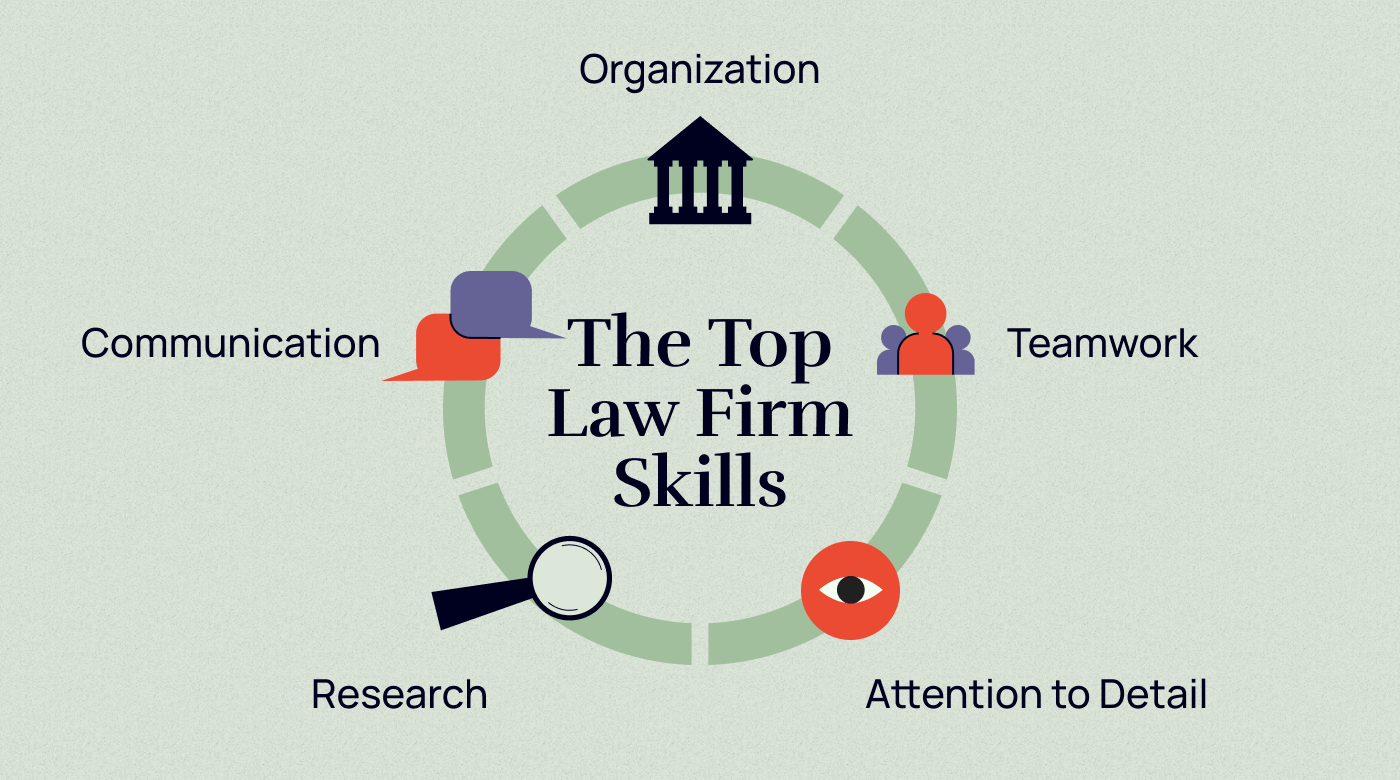There are a few steps you can take to make sure your firm runs smoothly. In this guide, I’ve put together some key components of effective law office management that are worthy of your attention. We'll cover the standard aspects of law practice management and highlight some useful legal software that can help lighten your load.
So whether you’re just starting out or want to shake up your firm for the future, I’ve got you covered.
Let’s dive in.
Start With a Plan
Every law firm needs a business plan—a detailed document that outlines how you want to run your legal practice for the next five years and beyond.
Your business plan will need an executive summary that includes your mission statement and company values. A law firm business plan is a key component in your strategic plans and goals Plus, you’ll need to include plans for the future. Any goals should be measurable, and you’ll need strategies for achieving them.

For example, if you’re in the city and want to take on corporate clients, you’ll likely charge more than someone in a rural town with a small family law practice. Keep in mind that a bigger firm will have more expenses to cover, including rent, salaries, and utility bills.
Think about the types of services you’ll offer and how much you’ll charge per hour. How many clients do you need to meet your goals? And who are your ideal clients?
Standardize Your Policies and Procedures
After you’ve developed your business plan, it’s time to create a policy and procedure manual.
Clear policies let your employees know what's expected of them in the workplace. In your manual, you’ll cover a broad range of topics that your team can refer to.
- Probation periods, expectations, salaries, and benefits.
- Performance reviews, including the process of firing someone. For instance, you may use a series of verbal warnings followed by a written one.
- Paid time off, maternity leave entitlements, and work-from-home policies.
- Sensitive information, privacy, and confidentiality rules.
- Employee payments, including frequency and payment methods.
- Expense reimbursement, bonuses, and pay rise guidelines.
- Harassment and discrimination laws, and workplace accommodation guidelines.
- Technology use, including email, internet, and company device policies.
Build Your Legal Team
Law firm owners can’t do it all on their own. It takes a team of people to run a law practice, and choosing the right partners and employees is an essential step.
Important skills in a law firm
Of course, you’ll need team members with the necessary education and industry experience. But there’s a range of other skills that are essential in any modern law firm.
What traits and skills should you look for?
- Team players
- Research skills
- Effective communicators
- Detail oriented
- Organization skills
From the top level down, there needs to be a culture of teamwork. Everyone needs to collaborate, and the workplace should be inclusive and fair.
You’ll deal with people from a diverse range of backgrounds. When growing your team, look for candidates with excellent communication skills.

Research skills are also important. Your team will be gathering and compiling information, and knowing how to conduct research efficiently and accurately during cases is vital.
Then there’s organization. This skill is transferable and can be gained in other industries. For example, someone who previously worked in an administrative role will know how to juggle schedules and file documents. An organized workforce is less likely to miss finer details.
In litigation, one mistake can impact an entire strategy. Attention to detail will mean fewer errors. From interviewing witnesses to writing reports to preparing affidavits, a detail-oriented team is one you can rely on.
Other skills that can benefit your law firm include critical thinking, problem-solving, and leadership abilities.
Different roles in a law firm
Here’s what your structure might look like:
Managing partner
A managing partner is at the top of the business structure. As a part-owner, they’re invested in the success of the law firm. They play an active role in managing the company and making sure everything runs smoothly.
All the topics I mention in this article, from writing business plans to documenting policies to setting budgets, are overseen by a managing partner.
If you’ve opened your own firm, you’ll be the managing partner. You’ll have extensive experience in the field of law. And, you’ll also have business and financial know-how.
Partner
A partner has a similar stake in your business as a managing partner—but they don’t manage the day-to-day running of the law firm. However, they still supervise junior team members and offer support and guidance.
Partners are usually senior lawyers who have worked their way up the ladder.
There are two types of partners: equity partners and non-equity partners. Equity and non-equity partners both practice law and represent clients in the courtroom.
Equity partners have an ownership stake in the company, which entitles them to a percentage of its profits. This goes both ways though, as they are also impacted financially when the company incurs operating losses.
Non-equity partners don’t have an ownership stake in the company but still receive a high salary.
Legal associate
Legal associates are licensed attorneys who haven’t achieved partner status yet. They hold law degrees and perform a range of legal tasks, such as:
- providing legal advice to clients
- drafting documents
- researching cases
- negotiating for their clients
- supervising paralegals
- appearing in court
There may be senior associates who are preparing for a partnership position. They also provide training, guidance, and mentorship to junior associates who are just starting out.
Some lawyers are called in to work on specific cases; these individuals are called contract attorneys.
Law clerk or intern
Law clerks work closely with supervising attorneys or judges. They are often still in law school or a recent graduate.
Law clerks are involved in the investigation and research phase in the lead-up to court. They assist judges or attorneys in any way that’s needed. Typically, law clerks may be asked to:
- compile evidence for cases
- prepare legal documents
- record information during court proceedings
- research case law
Law clerks look at previous trial records to find patterns to support the defense. They usually have an office but may also work in the field, such as visiting witnesses and courtrooms.
Law clerks typically work full-time and report to supervising lawyers.

Paralegal
Paralegals have a supportive role in a law firm. They perform similar duties as a law clerk but don’t have the same qualifications.
Paralegals help to gather evidence, draft legal documents, and collect statements. They talk to witnesses, schedule meetings, and file documents. They also rely on computer software to store and share information.
This is usually a full-time role within a law firm’s office space. Paralegals need an associate’s degree or higher and report to attorneys and those in leadership positions.
Legal assistant
Legal assistants are responsible for administrative tasks. They may sit behind a reception desk and transcribe letters and other documents, schedule appointments, and file documents. They’ll also greet your current and potential clients, and answer phone calls,
A high school diploma or GED is the minimum educational requirement for this role. However, some administrative assistants have an associate’s degree. Clerical experience or legal knowledge is preferred.
Marketing director
Your marketing director will be responsible for promoting your business. They are there to bring new clients through the door.

A marketing director’s duties will depend on your marketing plan. For example, they may manage your social media accounts, plan advertisements, and upload content to your website.
They may also organize events, find opportunities to sponsor community initiatives and get your voice heard on the radio.
There are different employment options available. Some law firm marketing directors work full-time or part-time, while others are independent contractors.
Most marketing directors have a bachelor’s degree or higher in marketing, public relations, or a related field.
Finding and keeping top talent
Successful law firms rely on their team members. However, finding stellar employees isn’t easy, and you’ll usually need to invest time and money as you advertise positions, interview candidates, and set up the onboarding process.
So once you have the right people in place, you’ll want to keep them there. A positive company culture, fair wages, and benefits will all make your employees feel valued. Consider having mentors and creating an open-door policy where junior team members can ask questions and learn on the job.
If you want to attract and retain employees, create pathways for success. You can offer opportunities for growth, such as programs to prepare staff for leadership positions. When you offer your team education and training, you’ll improve their skills, adding value to your company.
High-performing employees will also appreciate incentives such as bonuses and awards. Celebrating successes can improve workplace motivation.
To ensure your team has a good work-life balance, consider cutting back on lengthy meetings, offering work-from-home days, or providing flexible working hours.

Set Strategic Goals
Your law firm business plan will be packed with strategic goals. These goals may include the following:
- Expanding to other areas
- Adding new services
- Increasing billable rate
- Building a reputation as the top law firm in the area
- Offering pro bono services to underprivileged communities
You can monitor your progress toward these goals using key performance indicators (KPIs). You can have KPIs for everything from clients to productivity.
Let’s say your goal is to get five new clients a month. If you get five clients, you’ve hit your KPI. If you get more than five, well, you’ve smashed it.
Some businesses use a Net Promoter Score (NPS) to meet their client satisfaction goals. This is a simple survey in which you ask clients to rank their experience from 0 to 10. You can use this score to improve your service.
Make sure you share your goals with your team so they know what to reach for.
Stick to a Budget
Law firm leaders need to create—and maintain—a budget. You should set a formal budget every year. Most budgets are based on a company's accounting year (or annual reporting period). A good accountant with experience in your industry can support you with this task. Larger law firms often have in-house accountants.
If your business is new, your budget will include startup costs, such as business permits, licensing fees, and other registration costs. There will also be ongoing expenses, such as rent, wages, utilities, software subscriptions, taxes, and insurance.
Your budget will also include marketing expenses, such as advertising, business cards, and website design.
Now, the tricky part is working out your projected revenue. Depending on how long you’ve been running the practice, you may already be able to estimate how much you’ll make each month. The number of clients you have and your hourly rate will determine your projected revenue.
Generate reports to keep track of your incoming and outgoing cash flows. Establish a process for collecting client payments, and keep on top of bills and invoices to avoid unnecessary penalties or late fees.

Build an Online Presence
Your law firm will be competing against other local businesses. If you want to continue to grow, advertising and promotion will need to be part of your strategy.
Traditional advertising methods are important and can help attract potential clients. For example, radio, television, newspapers, and letterbox drops can put you in the minds of people in your community.
But these days, your target audience expects a little more. They want to know more about your brand from the convenience of their favorite electronic device.
Successful firms know how to build a strong online presence. The first step is to create a professional website with information about your services. Make sure you include a page about your team with your location and contact details.
Consider writing a blog to share your knowledge and build credibility with potential clients. If you live in an area with fierce competition, fresh content can be the key to standing out.
Social media is another way to grow your client list. You can target users in your local area to increase your visibility. Facebook is a must-have, but you can also try other platforms, such as Instagram, LinkedIn, or YouTube.
Remember, if your existing clients are happy, they’ll likely tell people they know —and we all know the positive impact of word of mouth.
Be a Client-Centered Law Firm
I don’t need to tell you that your clients are your bread and butter. Providing exceptional client service to your existing clients helps you gain new ones.
The question is, how can you go above and beyond for your clients? The answer is simple: by keeping them at the center of everything you do.
Remember when I mentioned that having the right company culture is a smart way to retain your legal team? Strong values and ethical standards will also benefit your clients. First impressions matter, and you want your clients to be met by a friendly and professional team.
Communication should be a priority from the first meeting until the case is closed. Check-in with your clients regularly, and always treat them with empathy.
Think about how you can improve the overall client experience. Don’t be afraid to ask previous clients if there is anything you can do to improve. People won’t always be upfront about issues unless you ask them. For example, one of your clients may be confused about legal jargon that wasn’t explained to them. If they let you know about this, you can improve your client communications.
Don’t wait fie them to tell you either, pay attention to them and take notes.
- What did they seem surprised by?
- Which parts of the experience appeared to exceed their expectations?
- Which parts of their process seemed to fall short of their expectations?
Technology can also help improve the experience for your clients. I’ll tell you about some possible solutions later in this guide.
Invest in Technology
Whether you need new accounting software or something that can up your legal billing or document management game, the right technology can make managing your law firm much easier. But before you make a commitment, be sure to compare different solutions side by side, and take advantage of free trials whenever possible.
Here are some popular software options to consider:
1. Amicus Attorney
Amicus Attorney comes with a range of features, giving you a centralized management system. For example:
- Share and view files to make your case management a more streamlined process.
- Access shared calendars, document management, payment processing, and billing solutions.
- Customize your dashboards for a personalized overview of your cases, goals, and budgets.
- Integrates with other software, such as Microsoft Office, Dropbox, or Quickbooks.
You can choose between a cloud-based version or a self-hosted version, depending on your law firm’s size. There are three subscriptions to choose from, and you’ll get customized pricing based on your needs.
Learn more about Amicus Attorney
2. Actionstep
Actionstep is a flexible, cloud-based customer relationship management (CRM) solution. It allows you to:
- Store all of your documents in one place and share them with your team.
- Access client details
- Manage case documents
- Compile reports.
It includes billing and accounting options, as well as client onboarding and time tracking. Integrate with other software, such as Microsoft Office, Gmail, Dropbox, NetDocuments, DocuSign, and InfoTrack.
There are three scalable subscriptions to choose from, and the inclusions vary. There’s the Practice Pro, Practice Pro+, and Premier. If you want to learn about pricing, you’ll need to contact the company.
Learn more about Actionstep
3. Centerbase
Centerbase has similar features to our other listed solutions. Security is a priority, and you can change the settings depending on the user’s role.
With Centerbase you can:
- Centralize your calendars, timekeeping, and document management.
- Use advanced reporting to help manage your goals.
- Keep track of your bills, reconcile invoices, and send reminders of overdue payments to your clients.
- Integrate with other software, including Quickbooks, Microsoft Office, NetDocuments, and Plaid.
You can start with the free demo to decide which version is right for your law firm. The premium plan has extras, such as automated time capture and ePre-bill.
Learn more about Centerbase
4. Clio
Another effective law firm management solution is Clio. It’s cloud-based, so it can be accessed by both in-person and remote teams.
You can use Clio for:
- Automated client intakes. Clients can book and modify meetings online, including virtual appointments.
- Case management, document management, calendars, and time tracking.
- All of your billing processes, such as general accounting, online payments, billing, and reporting.
- Integrate with more than 250 programs, including Outlook, Dropbox, Zoom, Quickbooks, Kenect, Mailchimp, and WordPress.
Clio comes in four levels: EasyStart, Essentials, Advanced, and Complete.
Learn more at Clio

5. Cosmolex
Cosmolex is an all-in-one software solution for law firms of all sizes. When you subscribe to Cosmolex, you can:
- Access personalized dashboards, calendars, and timers.
- Use built-in payment processing designed specifically for legal services. This automation makes it easier to meet your compliance obligations.
- Generate reports with minimal fuss. You won’t need an external solution, such as Quickbooks.
- Securely upload and share documents from anywhere. It can also be used for email management.
- Integrate with Google, Microsoft Office, CosmoLex Pay, and Chrometa.
If you sign up, you’ll start with the base plan and choose your add-ons. For example, you can add a CRM, a website, or e-signature tools.
Learn more at Cosmolex
6. PracticePanther
PracticePanther has a user-friendly interface. This solution also has a range of options for law firm managers. For example, you can:
- Access online payments, automated forms, workflows, and reporting.
- Give each client their own electronic case file, and your team can collaborate by attaching relevant documents.
- Take advantage of advanced security
- Integrate with different software, such as Zapier, TrustBooks, Outlook, Gmail, and Mailchimp.
There are three plans, and you can pay monthly or annually. The scalable options are Solo, Essential, or Business.
Learn more at PracticePanther
7. Tabs3
Tabs3 has a range of products, but I’ll focus on PracticeMaster—the law practice manager solution.
With Tabs3 you can:
- Take advantage of the matter manager, where you can create profiles for each client
- Add any relevant correspondence, such as appointments, case documents, or research
- Use calendars, billing tools, and the conflict of interest checker
- Streamline your onboarding process.
- Integrate with popular software, including Adobe, HotDocs, Trumpet, PaperPort, and WordPerfect.
The platform comes with a mobile app for use on the go. Not only that, but Tabs3 is also scalable software, so you can choose the features you need. For example, you can pay extra for a CRM.
There are different subscriptions to choose from, and you can contact the company for a customized package.
Learn more at Tabs3
8. Caret Legal
Caret Legal is another option worth considering. It has had a name change and was previously called Zola Suite.
This solution makes the client intake process a breeze. You can:
- Set up calendars and work schedules
- Share information with ease, and put all of your client case files in one secure location
- Locate contact details for anyone in your organization.
- Create customized rate cards and view unpaid invoices.
- Integrate with other software, including Microsoft, Google Workspace, IMAC, and RMail
There are three subscription levels: Enterprise, Enterprise Plus, and Enterprise Advance.
Learn more at Caret Legal
Summary
Managing a legal practice effectively takes the right team, tools, and a client-centric approach.
In this article, we covered the importance of a solid business plan, strategic goals, official policies and procedures, and some different software that can help you put it all into action.
For more legal insights and resources, subscribe to our newsletter and join a community of innovative legal practitioners shaping the future of law.


